NRI Group Low Carbon Transition Plan
Positioning of the Transition Plan
The NRI Group's long-term vision, "NRI Group Vision 2030 (V2030)", outlines priorities under its sustainability strategy (materiality), focusing on "Create a Sustainable Society" and "Achive NRI Group's Growth Strategy." As part of the theme "Contribute to Global Environment Through Collaboration with Business Partners," NRI has developed a "Low Carbon Transition Plan" to effectively manage its response to climate change, recognizing that protecting and restoring the environment is a collective global responsibility.
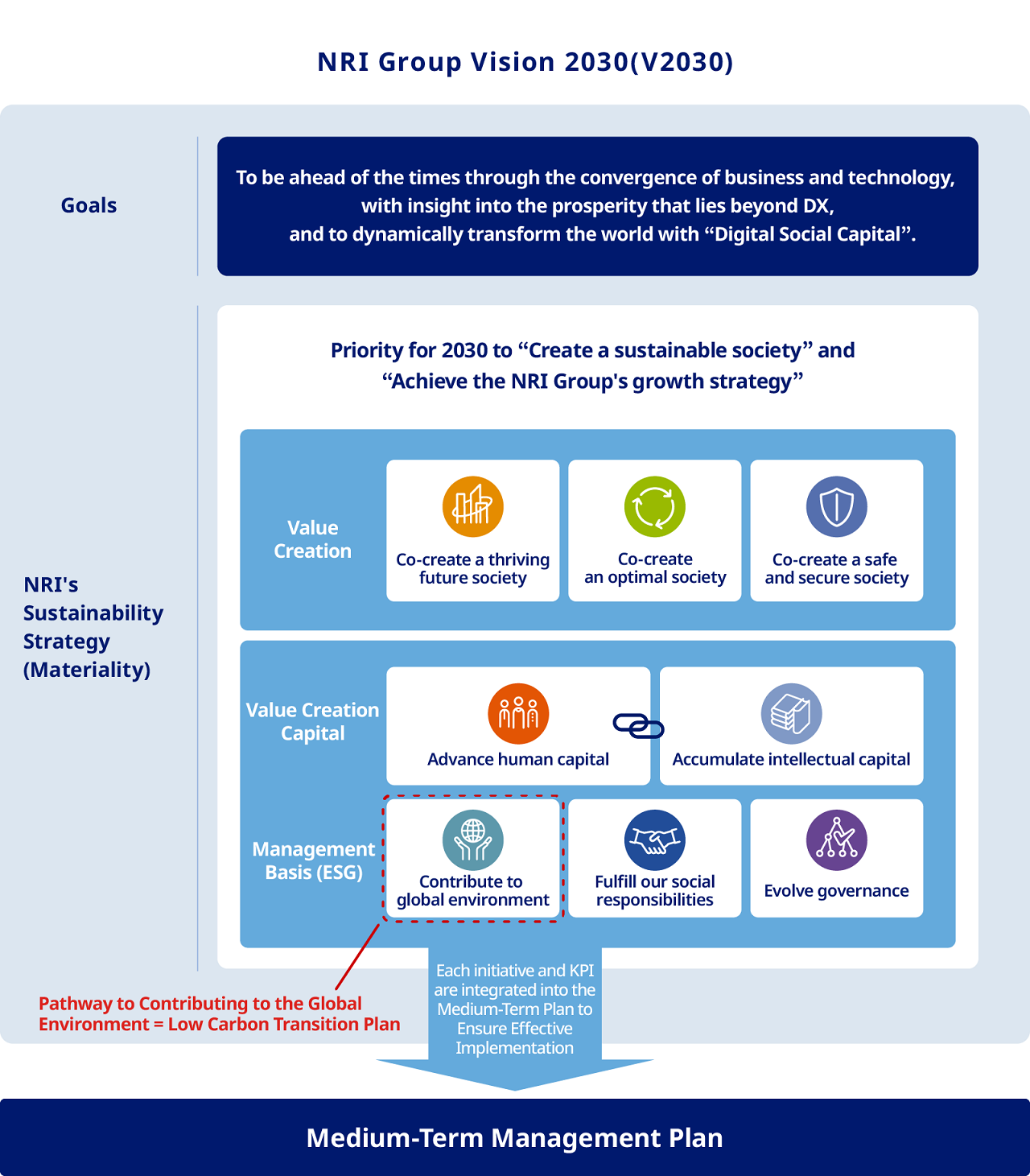
NRI Group's Efforts on Climate Change
The NRI Group has taken progressive steps on climate change, including issuing Japan's first yen-denominated green bond and spearheading the industry's shift to renewable energy for its data centers. Going forward, the group will continue to advance these initiatives, focusing on transitioning its offices to renewable energy and supporting its business partners.
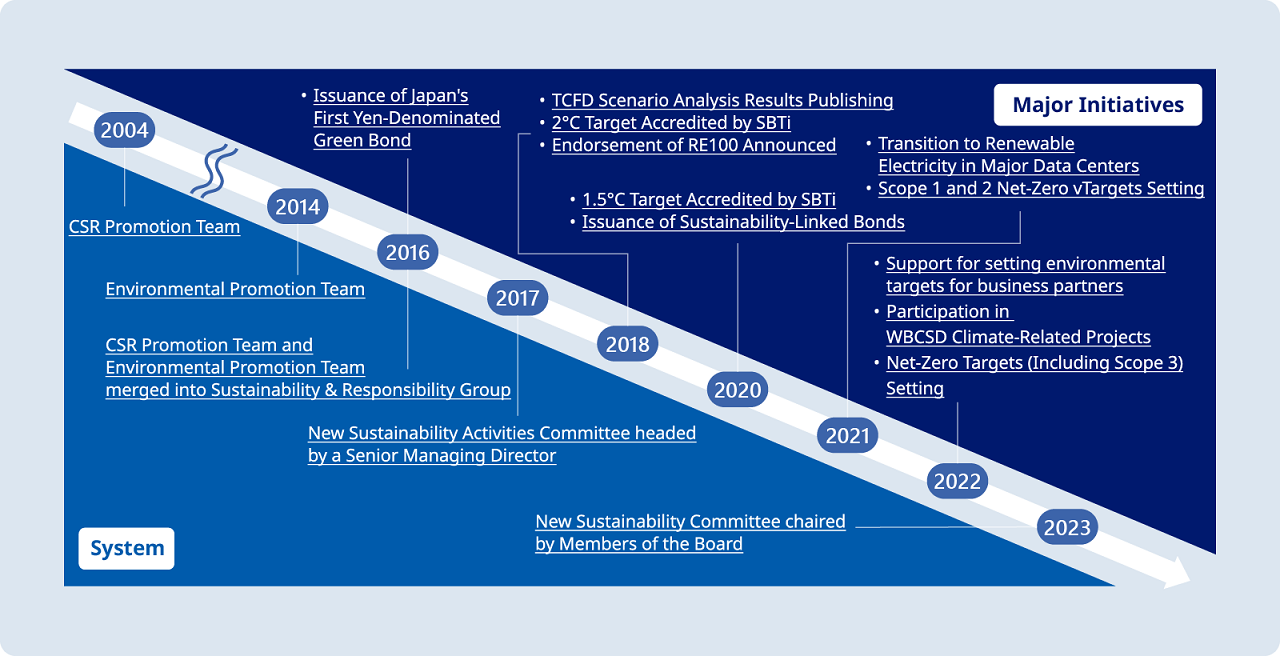
Overall Picture (NRI Group Environmental Targets and Plans)
The NRI Group's Low Carbon Transition Plan is being implemented with the approval and oversight of the Board of Directors to meet the environmental targets revised in FY2023. From FY2023 to FY2030, NRI plans to invest approximately 2 to 3 billion JPY in renewable energy procurement and other related activities.
The plan will be regularly reviewed, expanded, and updated, with progress monitored by the Sustainability-related conferences.
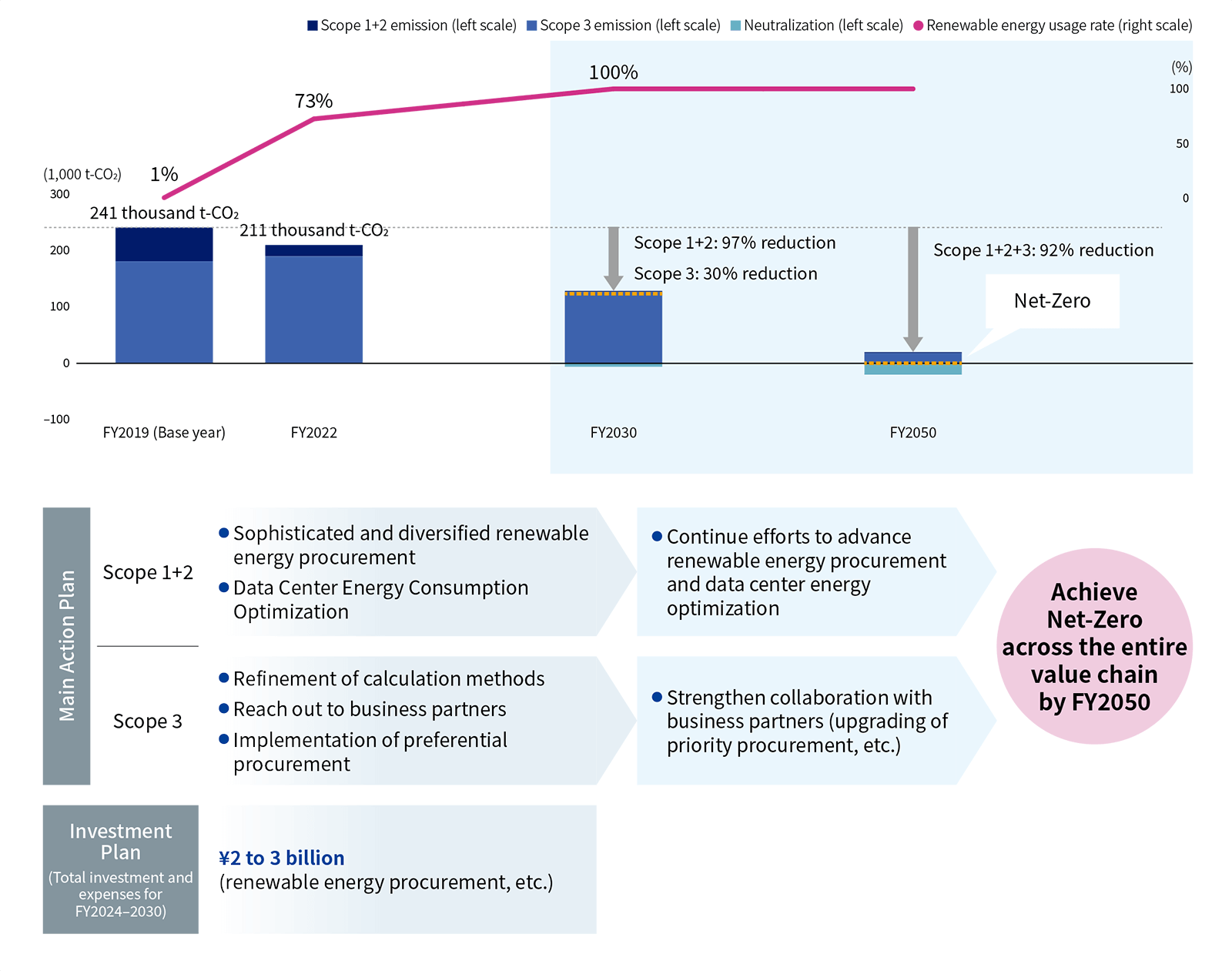
Governance
The NRI Group positions sustainability, including responses to climate change and biodiversity, as a critical management issue. The Board of Directors considers sustainability in its composition and oversight, and in addition to appointing outside directors who have insight regarding sustainability, the Board makes decisions on basic sustainability policies (including materiality) and other important matters. Sustainability Governance Committee has been established by the Board of Directors with only directors as members, and the Board of Directors and the Sustainability Governance Committee are responsible for overseeing the Company's efforts to address sustainability-related management issues.
In addition, under the supervision of the Board of Directors, a Sustainability Committee, chaired by a director in charge of promoting sustainability management, has been established. The Sustainability Committee deliberates on important sustainability-related issues (including related risks and opportunities), among others. There are subcommittees under this Committee, each chaired by a senior managing director. They are the Social Value Creation Promotion Committee and the Sustainability Promotion Committee, which promote group-wide sustainability and regularly report their progress to the Board of Directors.
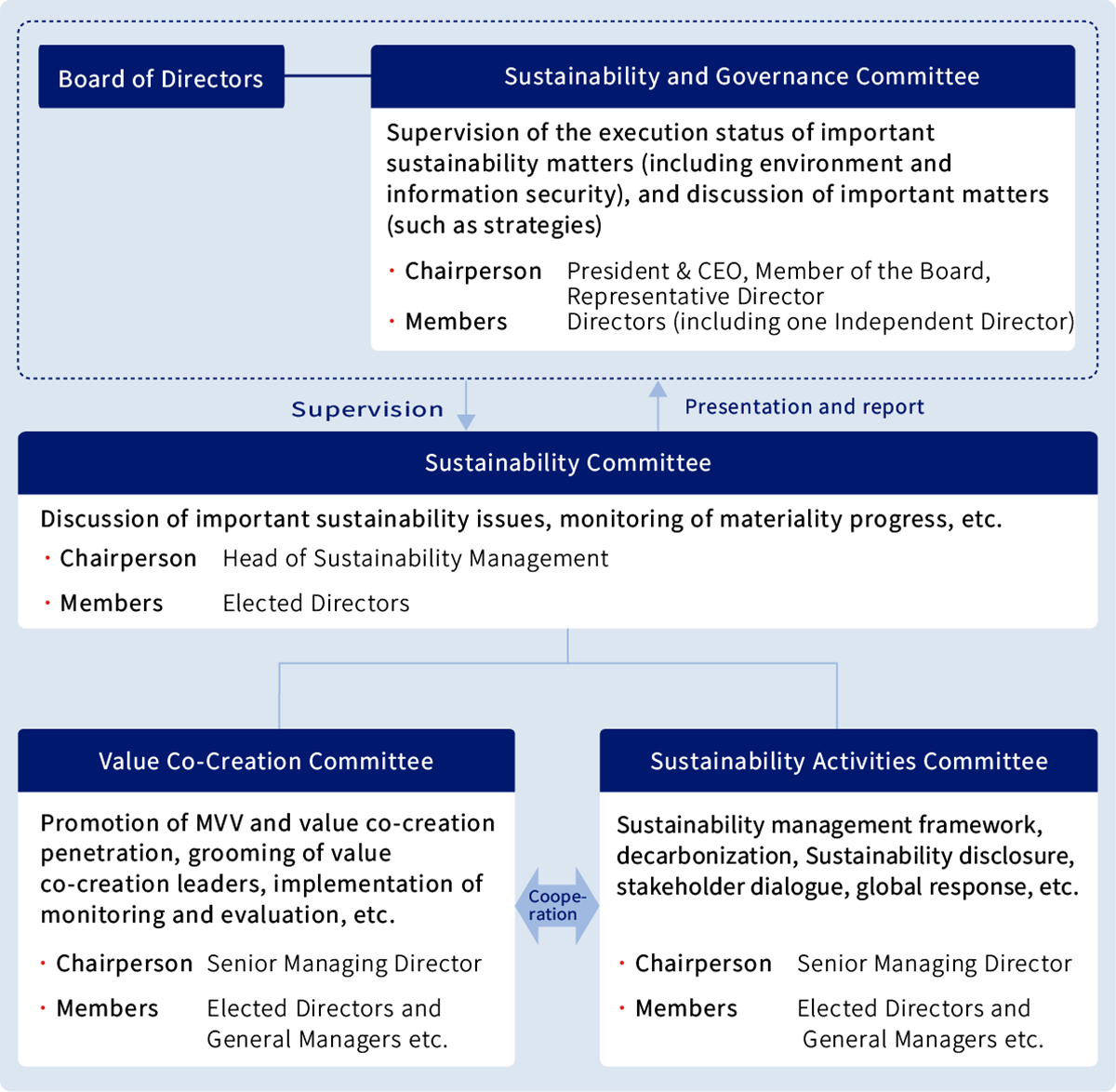
Strategy
Action Plan
Engagement
Public Policy Engagement
The NRI Group is actively collaborating with stakeholders to help achieve the goals of the Paris Agreement.As a think tank, we provide policy recommendations to government agencies, conduct research on legislation, and engage in environmental policy advocacy.
To contribute to Japan's mid- to long-term greenhouse gas emission reduction targets, we endorsed METI's GX (Green Transformation) League Basic Concept in March 2022. Building on this commitment, we declared our intention to join the GX League in March 2023, recognizing that decarbonization is vital not only for the NRI Group but for society as a whole.
Since FY 2022, the NRI Group has served as the secretariat and overall coordinator of the GX League. In this capacity, we identify the diverse needs of Japanese companies in advancing GX initiatives and ensure these needs are reflected in policymaking.
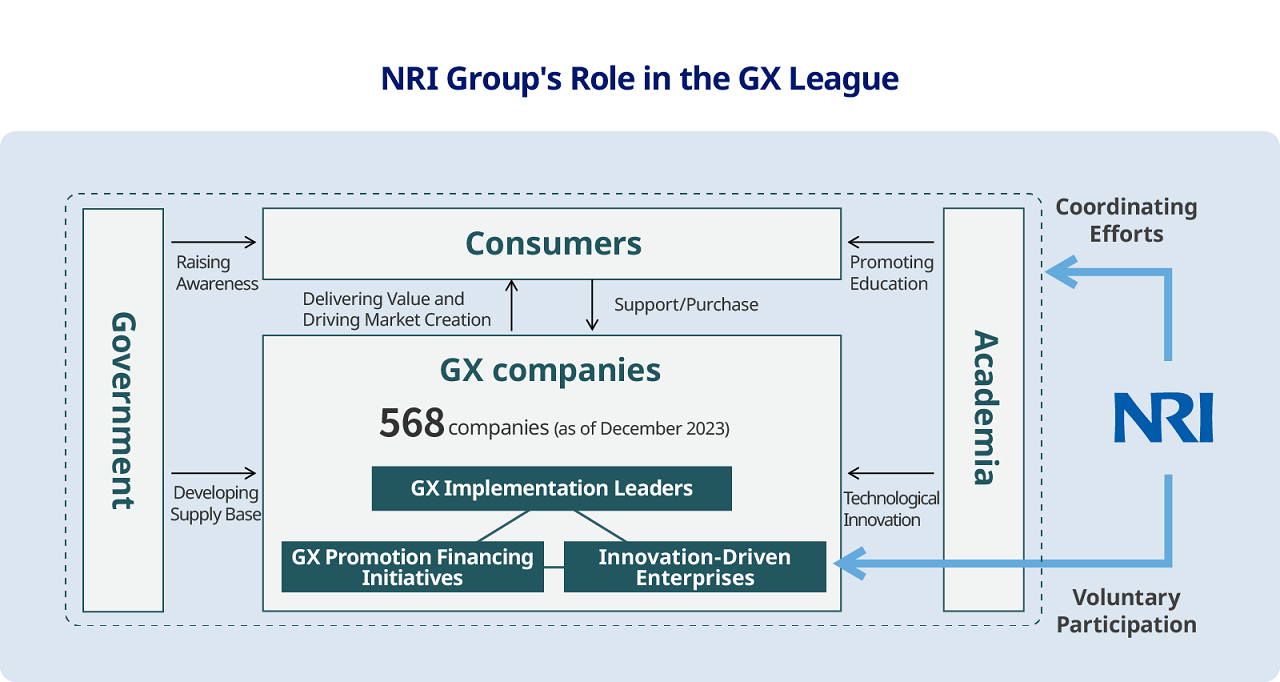
Engagement
Initiatives
Initiatives that NRI participatesThrough a wide range of partnerships with both domestic and international industry associations, the NRI Group is actively promoting and expanding its efforts to address climate change. This includes participation in sustainability initiatives such as aligning with the Paris Agreement and contributing to Japan's government-led efforts for the mid-to long-term reduction of greenhouse gas emissions. The Sustainability Activities Committee regularly reviews whether these initiatives are consistent with NRI's core policies on climate change and their alignment with the Paris Agreement.
The majority of the NRI Group's electricity consumption and greenhouse gas emissions are in Japan, and we are engaged in policy advocacy with the understanding that expanding the renewable energy market in Japan is crucial for achieving our environmental goals. As part of these efforts, in January 2021, through the Japan Climate Initiative (JCI), we advocated for an increase in Japan's renewable energy target for 2030, from the current, 22-24% to 40-50%. In June 2022, the NRI Group also called on the government to ensure that the Clean Energy Strategy, scheduled for formulation that year, focuses on promoting the development of renewable energy sources such as wind and solar power, facilitating the achievement of the 40-50% target by 2030.
The NRI Group participates in the WBCSD, a coalition of approximately 200 CEOs of companies committed to sustainable development, working together to help businesses transition to a sustainable society. The NRI Group has been involved in three projects from 2022 to 2023: the ‘Partnership for Carbon Transparency,’ ‘Avoided Emission,’ and ‘CFO Network.’
In the ‘Partnership for Carbon Transparency’ project, NRI contributed to the development of the ‘Pathfinder Framework ver. 2.0’ (published in January 2023), which structures the framework for calculating, certifying, and distributing PCF data. With its expertise in both consulting and IT solutions, the NRI Group played an integral role in this initiative.
For the ‘Avoided Emissions’ project, NRI contributed to enhancing the guidance by participating in weekly workshops and sharing insights based on our experience with reduction contributions in Japan. WBCSD emphasizes the importance of alignment with governments and policy authorities and has developed this guidance in accordance with the European Commission's CSRD. The guidance requires transition plans to align with the 1.5°C target. NRI supports this approach and is actively participating in the project.
Additionally, the NRI Group took part in the ‘SBT Campaign 2023-2024,’ organized by the international environmental NGO CDP in October 2023, as a member of the CDP Supply Chain Program. In this campaign, 307 financial institutions and 60 companies, including the NRI Group, encouraged companies to set science-based greenhouse gas emission reduction targets (SBTs) consistent with the 1.5°C scenario for approximately 2,100 influential companies worldwide.
Scenario Analysis
TCFD Scenario AnalysisRisk Management
Risk Management System
To ensure comprehensive risk management across the NRI Group, including climate-related risks, NRI has appointed a Risk Management Director and established the Integrated Risk Management Section to oversee the process. This section is responsible for developing and maintaining the risk management framework, identifying, assessing, and monitoring risks, and continuously enhancing the system. Chaired by the Risk Management Director, the committee meets twice a year to evaluate the PDCA (Plan-Do-Check-Act) cycle of risk management, discuss mitigation measures, and report the outcomes to the Board of Directors.
The risks associated with the NRI Group's operations are classified into 13 categories, each with specific risk items. These are periodically evaluated by the department responsible for risk management, with a focus on their severity and potential impact. Each year, the Integrated Risk Management Committee selects the most critical risks as 'Key Themes for Risk Management.'
One of the 13 categories is 'strategy risk,' which includes 'risks related to sustainability management,' such as climate change response.
To address climate-related risks, the Sustainability Activities Committee, established under the direction of the President, works alongside the Integrated Risk Management Committee to promote sustainability management. Since FY 2018, the committee has been reviewing and deciding on measures to identify, assess, and address climate-related risks and opportunities, taking into account both the external environment and the progress of internal initiatives. Significant climate change-related considerations are also reported to the Sustainability Committee for further review and decision-making.